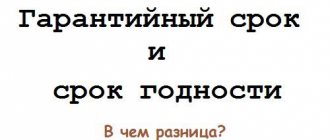The employer is obliged to strictly comply with the requirements of the Labor Code of the Russian Federation when deciding to punish guilty employees. It is important to take into account not only the circumstances of the offense and the severity of the employee’s act, but also the period of disciplinary action, which is established by the current labor legislation of the Russian Federation. For its imposition, the fundamental moment is the day the offense was discovered by the immediate supervisor of the employee who violated labor discipline. A disciplinary sanction also has a validity period, after which it is completely removed. Let's look into the nuances.
Registration of disciplinary action under the Labor Code
The manager must draw up an act upon the discovery of an offense committed by a subordinate in the presence of witnesses: 2 or more people. The act indicates the full name. and the position of the offender, full name. and the position of his manager, type of violation (lateness, absence from work, etc.). This document is a direct confirmation of the existence of a violation and is fundamental for inspectors from the State Labor Inspectorate and the court (in case of litigation).
The employer's action algorithm is simple:
- The reason for initiating an investigation into a disciplinary offense may be, among other things, a memorandum, which must be handwritten addressed to the director of the organization or immediate supervisor, containing subjective reasons why the employee violated labor discipline.
- Next, you need to call an employee and witnesses to your office, inform those present that on such and such a date, at such and such a time, an offense was committed by such and such a person.
- Require the offender to provide an explanation in writing. The employee has exactly 2 days to draw up the document after receiving the relevant request.
- After receiving an explanation or if the employee refuses to comment, in any case, an appropriate act must be drawn up. In the latter case, witnesses will be needed. The document will determine the employee’s guilt, which serves as one of the qualifying signs of misconduct.
- Issue an order to create a commission to investigate the misconduct committed by the employee. The results of the commission’s work can be approved by order and at the same time, by the same order, the employee can be found guilty of committing a disciplinary act. The order is issued within 3 days from the date of the violation and is handed over to the offender for signature (or an act of refusal must be drawn up). The rule applies equally to reprimand, reprimand and dismissal.
If an employee demonstratively refuses to give an explanation within the prescribed period or is absent from work on the day the misconduct was discovered and for 3 days after it, then it is necessary to send him a letter of receipt with the corresponding requirement at his place of residence or registration. A report on this action is also drawn up in the presence of witnesses.
What is the time period for imposing a disciplinary sanction on an employee?
Penalties cannot last forever, and the law (Article 194 of the Labor Code of the Russian Federation) provides the grounds on which they are lifted, that is, they cease to have legal significance.
Removal of foreclosure occurs if:
- A one-year period has expired from the date of application of any liability measure other than dismissal.
- The employer issued an order to remove any penalty (except dismissal). Such an order can be issued at the will of the manager himself, at the request of the employee’s immediate superiors, or the employee himself.
For ease of understanding, we will give examples.
Characters: director - Ivan Fedorovich; employee - Ilya Sergeevich.
Situation 1. Ivan Fedorovich, by his order dated February 1, 2017, imposed a penalty on Ilya Sergeevich in the form of a reprimand for being 15 minutes late for work. On 02/01/2018 (after a year), this order lost force, and Ilya Sergeevich is considered rehabilitated. This means that all consequences of the application of a penalty are canceled, and if a new penalty is applied, it will not be recognized as repeated.
Situation 2. Ivan Fedorovich, by his order dated February 1, 2017, imposed a penalty on Ilya Sergeevich in the form of a reprimand for being 15 minutes late for work. Ilya Sergeevich wrote a statement to the employer with a request to lift the penalty, indicating that he would no longer be late - this was the first and last time. Ivan Fedorovich believed the employee and issued an order to lift the penalty. From the moment the order is issued, Ilya Sergeevich is recognized as having no penalties.
***
Thus, disciplinary sanction is applied no later than six months from the moment the offense was committed, or a month from the moment it was discovered by the employer. The period for imposing a disciplinary sanction is 1 year after the order on its application is issued, or less if the employer cancels it ahead of schedule.
Time limits for imposing penalties
The imposition of a disciplinary sanction is limited in time. According to Art. 193 of the Labor Code of the Russian Federation, it must be applied to the offending employee after 1 calendar month from the date of discovery of the offense. The statute of limitations is restored if the employee was on sick leave or on vacation. In addition, the time required to take into account the opinion of the primary trade union organization or other representative body of employees is not taken into account.
The maximum period for applying the type of punishment in question (with the exception of the period of proceedings under the Criminal Code of the Russian Federation):
- 6 months - for all penalties, except for violations related to corruption legislation of the Russian Federation;
- 2 years - based on inspection results;
- 3 years - in cases of corruption.
The term for bringing disciplinary liability to an employee and the procedure for calculating it
The period for bringing disciplinary liability is the time period during which the employer has the right to apply penalties in the form of a reprimand, reprimand, or dismissal. The procedure for calculating this period is set out in parts 3, 4 of Art. 193 Labor Code of the Russian Federation.
The period for bringing to responsibility is 1 month from the moment the employer discovered the violation, but no later than six months from the moment the offense was committed.
For clarity, here are some examples:
Characters: director - Ivan Fedorovich; employee - Ilya Sergeevich; his immediate superior is Inna Aleksandrovna.
Situation 1: Ilya Sergeevich was late for work on 02/01/2017 by 15 minutes. The violation was recorded by Inna Aleksandrovna, writing a memo to director Ivan Fedorovich. However, I forgot to send the note, and only remembered about it on September 1, 2017 (7 months later). Having received the note, Ivan Fedorovich did not formalize the penalty against Ilya Sergeevich, since the period had expired - six months from the date of the violation.
Situation 2: Ilya Sergeevich was late for work on 02/01/2017 by 15 minutes. The violation was recorded by the director, Ivan Fedorovich, but he forgot to fill out the documents and bring Ilya Sergeevich to disciplinary liability. He remembered this only on 03/03/2017 (after 1 month and 2 days). Since 1 month had passed since Ilya Sergeevich committed the violation, the director realized that filing a penalty was illegal and did not do so.
Early withdrawal
The action of a disciplinary sanction can be stopped before the expiration of the period established by the Labor Code of the Russian Federation:
- at the initiative of the organization's management;
- at the request of a trade union or manager (in the latter case, the manager must send a petition - presentation to a higher manager of the organization, obtain signatures and send the material to the Human Resources Department for drawing up an order);
- at the employee's request.
After the Order to lift a disciplinary sanction against an employee for high performance, impeccable discipline and other achievements is issued, the document must be given to the employee for signature.
It is important to correctly formalize the collection procedure under the Labor Code of the Russian Federation, otherwise the employer may have problems during the first inspection. In addition, the employee can apply to the State Tax Inspectorate or the court to restore the violated right, and in most cases the legislator will be on his side.
If you have any questions regarding the Labor Code of the Russian Federation, you should contact trusted specialists. International labor law lawyers will provide detailed advice on your issue. To contact a specialist, call 8 (800) 222-24-50, or order the service on the website rosco.su.
How to file a disciplinary sanction
The manager, having discovered a violation of discipline, must draw up a report about it in the presence of at least two people.
This act will become a document that confirms the fact that an offense has been committed. Before applying a disciplinary sanction, the employee must be required to provide a written explanation of the reasons for the misconduct.
The explanatory note is written by hand addressed to the head of the company or the person who has the right to impose disciplinary sanctions. In the note, the employee must state the reasons for the violation of labor discipline. This is required by the Labor Code.
If the employee does not provide an explanation within two days or demonstratively refuses to do so, it is necessary to draw up a report about this.
Read in the berator “Practical Encyclopedia of an Accountant”
How to issue a disciplinary order
Article 193 of the Labor Code of the Russian Federation. The procedure for applying disciplinary sanctions (current version)
1. The commented article establishes the procedure (rules) for bringing employees to disciplinary liability.
In accordance with Part 1 of this article, the employer, before applying a disciplinary sanction, must require an explanation from the employee in writing. Such an explanation is necessary to clarify all the circumstances of the commission of a disciplinary offense, its illegality, as well as the degree of guilt of the employee who committed the offense. However, the employee’s failure to provide a written explanation is not an obstacle to the application of a penalty. If after two working days the employee does not provide the specified explanation, then a corresponding act is drawn up. In the event of a dispute about the legality of applying a disciplinary sanction, such an act will be evidence of the employer’s compliance with the rules for bringing to disciplinary liability.
2. Part 3 of the commented article limits the possibility of applying disciplinary sanctions to certain statutes of limitations.
A disciplinary sanction can be applied to an employee no later than one month from the date of its discovery. The one-month period for imposing a disciplinary sanction is calculated from the day the offense was discovered. The day of detection of the misconduct, from which the month period begins, is considered the day when the person to whom the employee is subordinate for work (service) became aware of the commission of the misconduct. It does not matter whether this person has the right to impose disciplinary sanctions.
The period established for applying a penalty does not count the time during which the employee was absent from work due to illness or being on vacation. In this case, vacation that interrupts the flow of a month includes all vacations provided by the employer in accordance with the law, incl. annual (main and additional), leaves in connection with training in educational institutions, leaves without pay (clause 34 of the Resolution of the Plenum of the Armed Forces of the Russian Federation dated March 17, 2004 N 2).
In cases where dismissal is applied as a disciplinary sanction, the specified period does not also include the time required to comply with the procedure for taking into account the opinion of the representative body of employees, if taking such an opinion into account is mandatory (Article 82, 373 of the Labor Code, see comment. to them).
The employee’s absence from work for other reasons, incl. in connection with the use of rest days (time off), regardless of their duration (for example, with a rotational method of organizing work), does not interrupt the flow of the specified period.
When applying a disciplinary sanction in the form of dismissal under sub. "g" clause 6, part 1, art. 81 of the Labor Code, the monthly period is calculated from the date of entry into force of a court verdict or resolution of a judge, body, official authorized to consider cases of administrative violations (clause 44 of the Resolution of the Plenum of the Armed Forces of the Russian Federation dated March 17, 2004 N 2).
It is not permitted to apply a disciplinary sanction after one month from the date of discovery of the offense or after six months from the date of its commission. If a disciplinary offense is discovered as a result of an audit, inspection of financial and economic activities or an audit, the employer has the right to apply disciplinary action to the employee within two years from the date of the offense. The time frame for the criminal proceedings does not count towards the specified time limits.
3. For each disciplinary offense, only one disciplinary sanction can be applied to an employee. However, in cases where failure to perform or improper performance due to the fault of an employee of the labor duties assigned to him continued, despite the imposition of a disciplinary sanction, the employer has the right to apply a new disciplinary sanction to him, incl. dismissal on the basis of clause 5, part 1, art. 81 TK. It must be borne in mind that the employer has the right to apply a disciplinary sanction to the employee even when, before committing the offense, he filed an application for termination of the employment contract on his own initiative, since the employment relationship in this case terminates only after the expiration of the notice period for dismissal (clause 33 Resolution of the Plenum of the Armed Forces of the Russian Federation dated March 17, 2004 No. 2).
However, an employee who has terminated his employment relationship with the employer cannot be subject to disciplinary action.
Disciplinary action is applied by the head of the organization. Other officials may apply disciplinary sanctions if such powers are granted to them by the relevant documents (charter of the organization, order of the manager, etc.).
Application of penalties for committing a disciplinary offense is a right, not an obligation of the employer. Therefore, the employer may, taking into account all the circumstances of the case, not impose a penalty on the employee who has committed a disciplinary offense, but limit himself to a conversation with him or an oral remark. When applying disciplinary action, it is necessary to strictly adhere to the rules established for this purpose. If, when imposing a disciplinary sanction, these rules are violated by the employer, the body considering the labor dispute about the legality of imposing a sanction may recognize the application of the disciplinary sanction as unlawful.
4. The application of a disciplinary sanction is formalized by an order (instruction) of the employer. The order (instruction) indicates the basis for applying the penalty, i.e. the specific disciplinary offense for which the employee is subject to disciplinary action, and its type (remark, reprimand, etc.). It must be borne in mind that in the event of a disciplinary sanction in the form of dismissal, one dismissal order is issued, and not two separate orders (an order to impose a penalty in the form of dismissal and an order to terminate the employment contract), as is sometimes the case in practice .
This circumstance was brought to the attention of the Judicial Collegium for Civil Cases of the Supreme Court of the Russian Federation. The Appeal Determination No. 60-APG12-7 dated 09.11.2012 in the case of Sh. states that the application of a disciplinary sanction to an employee in the form of dismissal and termination of an employment contract with an employee by separate orders is based on an erroneous interpretation of labor law norms.
The issuance of an order to apply a disciplinary sanction to the plaintiff in the form of dismissal in itself indicated the termination of the employment contract with him, since the grounds for dismissal specified in this order, namely clause 5 of part 1 of Art. 81 of the Labor Code, is contained in the list of grounds for termination of an employment contract at the initiative of the employer, provided for in Art. 81 TK. By virtue of clause 4, part 1, art. 77 of the Labor Code, termination of an employment contract at the initiative of the employer (Articles 71 and 81 of the Labor Code) is the basis for termination of the employment contract. Thus, the defendant had no grounds for issuing order No. 236-k dated July 4, 2012 to terminate the plaintiff’s employment contract after his dismissal on the basis of order No. 194-k dated May 30, 2012.
An order (instruction) to impose a penalty is announced to the employee against signature within three working days from the date of its publication, not counting the time the employee is absent from work. If an employee, for one reason or another, refuses to familiarize himself with the order (instruction) to apply a disciplinary sanction against him against signature, then a corresponding act is drawn up.
According to established practice, the order to impose a penalty is brought to the attention of all employees of the organization.
If, in the opinion of the employee, a disciplinary sanction was applied to him unreasonably or the penalty does not correspond to the gravity of the offense committed, he has the right to appeal the disciplinary sanction to the state labor inspectorate and (or) bodies for the consideration of individual labor disputes in the manner prescribed by law.
Comment source:
Rep. ed. Yu.P. Orlovsky “COMMENTARY ON THE LABOR CODE OF THE RUSSIAN FEDERATION”, 6th edition ACTUALIZATION
ORLOVSKY Y.P., CHIKANOVA L.A., NURTDINOVA A.F., KORSHUNOVA T.YU., SEREGINA L.V., GAVRILINA A.K., BOCHARNIKOVA M.A., VINOGRADOVA Z.D., 2014
Duration of disciplinary action
The collection can be considered invalid if 1 year has passed since the time the order was accepted. If an unscrupulous employee is punished again before the end of this period, the validity period of the first order is reset and a new period is established from the date on which the new order was approved. This allows you to record two punishments at once. This may lead to the emergence of grounds to record the fact of repeated violations. The manager has the right, according to the Labor Code, to dismiss the employee. For the latter, the penalty will not directly affect the future career.
Transferring to another position at the enterprise does not affect the duration of the measures or the termination of the order. Removal of penalties is carried out by decision of the manager or upon termination of the employment relationship, since such orders are distributed only within the organization.
Cancellation after expiration
The employer can cancel the order ahead of schedule; for this, a new order is also issued. If the validity period has expired, it will be canceled automatically without issuing a special document. The employee also does not have to be notified. But the employee must take this situation seriously and strictly observe internal discipline during the term and avoid repeated violations.
The employee may be on vacation or absent from the workplace for other reasons; his presence at the workplace is not necessary for automatic removal of the penalty. But this only applies to reprimands and remarks. If we are talking about dismissal, cancellation does not apply to this type of penalty.
A penalty that has expired cannot be a basis for denying an employee incentives, i.e., it should not have any consequences. This also applies to wages, which take into account bonuses and other material rewards. Interrupted working hours are also taken into account for the possibility of obtaining titles.
Remarks can be automatically removed when the employee, from the moment of signing the order of collection, no longer violates the internal labor discipline of the enterprise.






